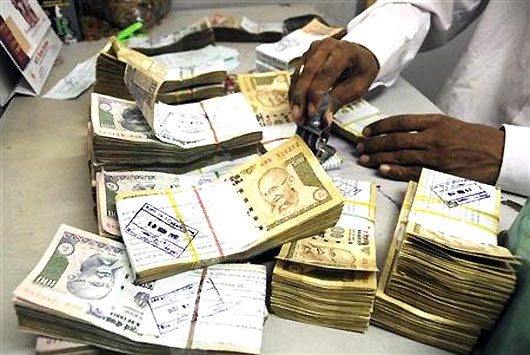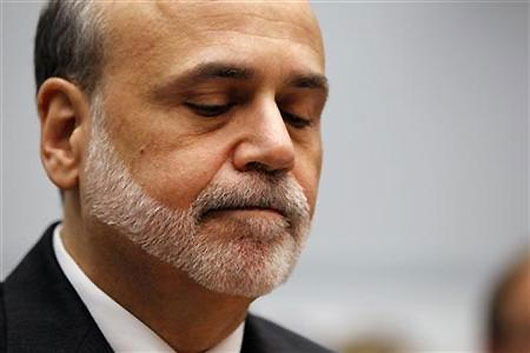Photographs: Fayaz Kabli/Reuters Manoj Kumar and Rafael Nam in New Delhi/Mumbai
A cautious Reserve Bank of India (RBI) with limited foreign exchange reserves stands as India's main line of defence against a currency at record lows - and markets are fretting it can't stand strong enough unless the government moves firmly to boost foreign inflows.
The RBI stepped in to sell dollars several times on Thursday, traders said, including after the rupee slumped to a record low of 59.9850. It was Asia's worst performing currency on a day that saw a global sell-off.
Traders say the RBI's firepower is likely to be limited given foreign exchange reserves of $290 billion, enough to cover imports for just seven months - an unsettling prospect for a country with a record high current account deficit.
That is keeping investors on edge. The government is preparing to open more sectors to foreign investment, hoping to repeat the magic from September, when New Delhi lifted state-set diesel prices and opened up the retail and aviation sectors.
Those actions sparked a foreign investor-driven market rally in the ensuing months. Since the start of 2012, there's been net inflows into stocks and debt of about $47 billion, which has helped fund the current account deficit and prevent the rupee from falling even further.
In recent months, the reform process has sputtered, taking some of the shine off India for investors.
"Both the willingness and ability appear to be limited for the government," said Samiran Chakrabarty, head of research at Standard Chartered Bank in Mumbai.
"The RBI is also favouring relative free movement of the currency," he added.
Click on NEXT for more...
Rupee: Asia's worst performing currency
Photographs: Jayanta Dey/Reuters
A weaker rupee makes it harder for the RBI to cut interest rates more after easing three times this year, and it exacerbates concerns about financing a current account deficit that shot up to 6.7 percent of gross domestic product in the October-December quarter.
The rupee was last trading at 59.76/78, from its 58.71/72 close on Wednesday.
The falling rupee and a narrowing differential with U.S. Treasury yields have hit Indian government bonds hard, spurring foreign investors to sell a net $4.7 billion over 19 sessions through Tuesday.
The benchmark 7.16 pct 2023 bond yield rose 12 basis points to 7.38 percent from its previous close, which led to the fixed income association scrapping trading bands.
Click on NEXT for more...
Rupee: Asia's worst performing currency
Image: US Fed Chairman Ben Bernanke.Photographs: Jason Reed/Reuters
Coming reforms?
Though the rupee's most recent tumble has been sparked by the Federal Reserve's signal of a rollback in its monetary stimulus and a weakening China economy, India remains among the worst performers in emerging markets since May.
India's chief economic adviser, Raghuram Rajan, on Thursday reiterated on Thursday that the government will stick to longer-term measures to support the rupee but gave no specifics.
"We should not let ourselves be led by the markets into directions we don't want to go," he told reporters. "I do not think any one action is central to calming markets."
Any measures are likely to hew closely to Finance Minister P Chidambaram's pledge last week to raise foreign direct investment limits and revise locally produced gas prices and power tariffs.
Click on NEXT for more...
Rupee: Asia's worst performing currency
Photographs: Ajay Verma/Reuters
The government is also looking to curb gold imports, a particular source of stress in the current account deficit, given that the yellow metal and oil are India's top two imports.
Yet how effective the government can be is in question.
Since opening the retail sector, India has imposed new rules requiring foreign supermarkets to set up their own warehouses and stores in India, which could further delay the entry of companies such as Wal-Mart Stores Inc.
"The market does not react to statements now. It looks for actions," said Paresh Nayar, head of fixed income and foreign exchange trading at First Rand Bank.
Additional reporting by Swati Bhat, Subhadip Sircar, Archana Narayana and Neha Dasgupta in Mumbai and Rajesh Kumar Singh in New Delhi






article